#bullet ballots
Explore tagged Tumblr posts
Text
This nugget about Trump 'bullet ballots' with no down ballot votes is a 🚨🚨🚨🚨.
All the swing states had shockingly large amounts of these bullet ballots.
North Carolina had 350,000 bullet ballots!!

Warning of suspected election tampering
Here is a very detailed letter by a technology expert that there are "multiple and extremely clear indications the Presidential vote was willfully compromised."
Read it on Substack.
I've wondered about this since the morning after the election.
What happened to all those excited voters who posted their ballots early?
What happened to the tens of thousands of people who showed up for Harris rallies? And the skimpy crowds at the orange guy's rallies?
What happened to ALL THOSE REPUBLICANS who said they were voting for Harris because orange guy couldn't be trusted?
What happened to the 40 former cabinet members, intelligence officials, military leaders, and others who said he was unfit for office?
What happened to the proof that Russia interfered in 2016 and 2020 - and why aren't we checking on that in 2024?
Please tell me that the Harris campaign and the Department of Justice (or whoever oversees elections) is looking into this.
462 notes
·
View notes
Text
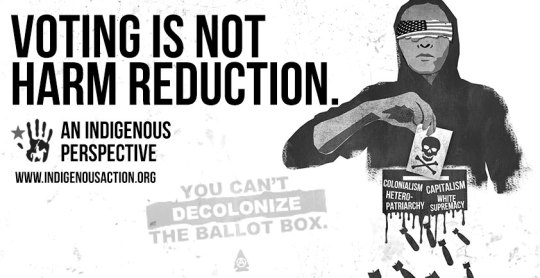
So long as the political and economic system remains intact, voter enfranchisement, though perhaps resisted by overt white supremacists, is still welcomed so long as nothing about the overall political arrangement fundamentally changes. The facade of political equality can occur under violent occupation, but liberation cannot be found in the occupier’s ballot box. In the context of settler colonialism voting is the “civic duty” of maintaining our own oppression. It is intrinsically bound to a strategy of extinguishing our cultural identities and autonomy.
[...]
Since we cannot expect those selected to rule in this system to make decisions that benefit our lands and peoples, we have to do it ourselves. Direct action, or the unmediated expression of individual or collective desire, has always been the most effective means by which we change the conditions of our communities. What do we get out of voting that we cannot directly provide for ourselves and our people? What ways can we organize and make decisions that are in harmony with our diverse lifeways? What ways can the immense amount of material resources and energy focused on persuading people to vote be redirected into services and support that we actually need? What ways can we direct our energy, individually and collectively, into efforts that have immediate impact in our lives and the lives of those around us? This is not only a moral but a practical position and so we embrace our contradictions. We’re not rallying for a perfect prescription for “decolonization” or a multitude of Indigenous Nationalisms, but for a great undoing of the settler colonial project that comprises the United States of America so that we may restore healthy and just relations with Mother Earth and all her beings. Our tendency is towards autonomous anti-colonial struggles that intervene and attack the critical infrastructure that the U.S. and its institutions rest on. Interestingly enough, these are the areas of our homelands under greatest threat by resource colonialism. This is where the system is most prone to rupture, it’s the fragility of colonial power. Our enemies are only as powerful as the infrastructure that sustains them. The brutal result of forced assimilation is that we know our enemies better than they know themselves. What strategies and actions can we devise to make it impossible for this system to govern on stolen land? We aren’t advocating for a state-based solution, redwashed European politic, or some other colonial fantasy of “utopia.” In our rejection of the abstraction of settler colonialism, we don’t aim to seize colonial state power but to abolish it. We seek nothing but total liberation.
Voting Is Not Harm Reduction - An Indigenous Perspective
#indigenous action#2024 elections#voting#on one hand i think if one opponent is a mask off fascist white people have an obligation to vote against them As The Least We Can Do#but if that's all we're doing? that and bullying other people who see a futility in participating in a colonial institution of 'democracy'?#sorry but um. shut the fuck up#if we spent half as much energy on direct action to support each other in ways that help people REGARDLESS of who wins what election#as we did on yelling at Other Leftists about voting i think we would get a hell of a lot more actual shit done#and sure as hell help more actual real life people who we claim to be helping by yelling at other people to vote#i'm talking to me here like#our current blue harm reduction candidate actively supporting a genocide should make you feel like maybe this shit doesn't fucking work#because it doesn't <3#harm reduction as the least we can do needs to be a call to action via vote AND actual action or it's not a call to anything at all#the least we can do needs to be motivating AND convicting#it's the least we can do so fucking do it. it's the least we can do so if that's All you do sit the hell down or stand the fuck up#for people who the status quo serves it needs to be the ballot AND the bullet or our ballot means fuck all for real liberation
321 notes
·
View notes
Text

Right now, in this country, if you and I, 22 million African-Americans -- that's what we are -- Africans who are in America. You're nothing but Africans. Nothing but Africans. In fact, you'd get farther calling yourself African instead of Negro. Africans don't catch hell. You're the only one catching hell. They don't have to pass civil-rights bills for Africans. An African can go anywhere he wants right now.


#african#afrakan#kemetic dreams#africans#brownskin#brown skin#afrakans#african culture#afrakan spirituality#ballot or the bullet#negro#negros#omowale#malcolmx#malcolm x#civil rights movement#black panthers#african history#african american#african american history#african america history
30 notes
·
View notes
Text


34 notes
·
View notes
Photo
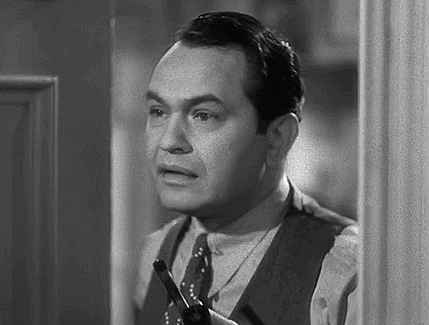

Edward G. Robinson and Joan Blondell in Bullets or Ballots (1936) dir. William Keighley
#edward g robinson#joan blondell#william keighley#1936#1930s#30s#crime#gangster film#oldhollywoodedit#classic hollywood#bullets or ballots
51 notes
·
View notes
Video
youtube
Malcolm X - The Ballot or the Bullet (1966)
#youtube#Malcolm X - The Ballot or the Bullet (1966)#Malcolm X Full Speeches#Malcolm X#Full Speeches
3 notes
·
View notes
Text
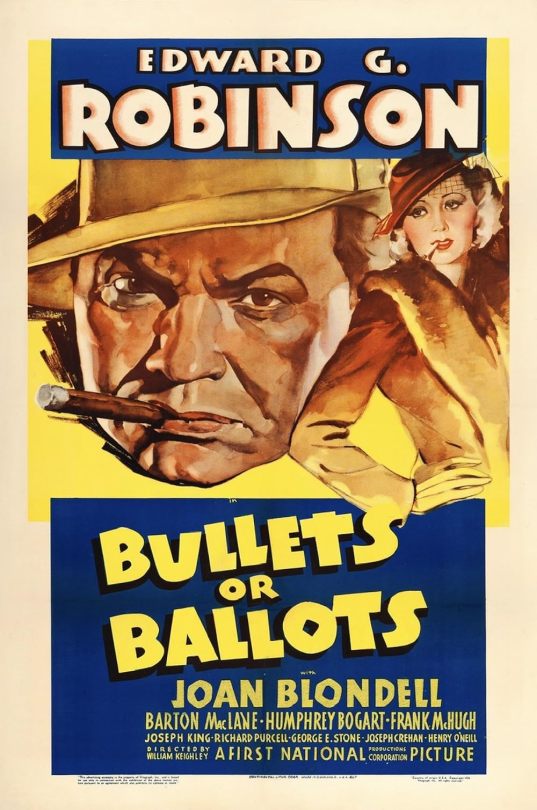
#Bullets or Ballots#Edward G. Robinson#Joan Blondell#Barton MacLane#Humphrey Bogart#Frank McHugh#Joe King#Dick Purcell#George E. Stone#Joseph Crehan#Henry O'Neill#William Keighley#1936
3 notes
·
View notes
Text
Day One Hundred Thirty-Eight
We had remote school today, but not really because the storm dumped rain, then ice, then wet, heavy snow all night and all day. So that brought down tree branches- and whole trees- all over the place, including around my apartment (woke up to a giant branch falling on the power lines around 5:30AM). Somehow, I still had power, but then a bunch more branches came down, hit the poles, wham!
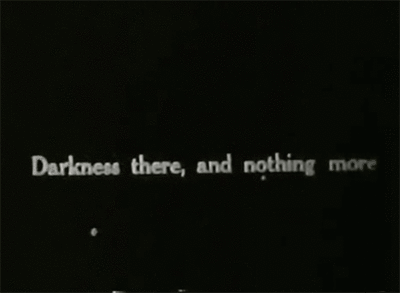
Luckily, I'd told all my students what their instructions would be and posted everything to Classroom yesterday. Plus, I could still email, and even managed to use my phone to hold brief Google Meets with each of my classes (The Principal obviously waived that expectation today, but I figured I'd attempt it anyways because routines are helpful). After checking in via Meet and asking any clarifying questions about the day's expectations, my ninth graders kept doing what they've been doing all week: reading their books, drafting their current events-write ups. My seniors had to tell me about the struggle to get the Civil Rights Act of 1964 through Congress, then read Malcolm X's "The Ballot or the Bullet" in preparation for a discussion about it and King's "Letter from Birmingham Jail."
I was originally planning on having that discussion tomorrow, but I emailed my students to let them know that I'm going to reschedule it for Tuesday in order to ensure that everyone's prepared. There's a chance we'll end up having another remote learning day tomorrow anyhow. At the very least, we'll have a delayed opening, and I don't want to rush a through discussion in a shortened block.
So, yeah, embracing the change. Adaptability and flexibility are two very key skills of teaching!
#teaching#teachblr#teacher#edublr#education#high school#social studies#the principal#remote learning#the ballot or the bullet#letter from birmingham jail#martin luther king jr#malcolm x#day one hundred thirty eight
2 notes
·
View notes
Text
The Ballot or The Bullet....
youtube
The Ballot or The Bullet....

Did this MF just say Malcolm fuckin X was a Democrat????
29K notes
·
View notes
Photo










(via "The ballot is stronger than the bullet " Magnet for Sale by ONLYBAST)
0 notes
Text

The Last Movie I Watched...
Bullets or Ballots (1936, Dir.: William Keighley)
1 note
·
View note
Text
GUN VIOLENCE ARCHIVE 2023 October 14, 2023 287th day of year 2023
U.S.A. mass shootings this year : 545
Total # of Gun Violence deaths All Causes 33,912
READ MORE https://www.gunviolencearchive.org/
The Gaza Strip: Why the history of the densely populated enclave is key to understanding the current conflict
October 14,2023
"The focus on conflict in the Middle East has again returned to the Gaza Strip, with Israel’s defense minister ordering a “complete siege” of the Palestinian enclave.
"The military operation, which involves extensive bombing of residences, follows a surprise attack on Oct. 7, 2023, by Hamas militants who infiltrated Israel from Gaza and killed around 1,200 Israelis. In reprisal airstrikes, the Israel military has killed over 1,400 Gazans. And that figure could escalate in the coming days. Meanwhile, an order to cut off all food, electricity and water to Gaza will only worsen the plight of residents in what has been called the “world’s largest open-air prison.”
"Israel says that the blockade on Gaza is necessary to secure the safety of its population and will be lifted when Hamas renounces violence, recognizes Israel and abides by previous agreements."
"But how did Gaza become one of the most densely populated parts of the planet? And why is it the home to militant Palestinian action now? As a scholar of Palestinian history, I believe understanding the answers to those questions provides crucial historical context to the current violence. Israel has launched four major military assaults on Gaza – in 2008-09, 2012, 2014 and 2021 – in efforts to destroy Hamas’ military capabilities. Those wars killed 4,000 Palestinians, more than half of whom were civilians, along with 106 people in Israel."
READ MORE The Gaza Strip: Why the history of the densely populated enclave is key to understanding the current conflict - Alternet.org
October 12, 2023 READ MORE
#human beings/mass murder machines#American gov't state-sponsored terrorism?#American bullets#ballots#& bullshit#contend for world dominance.
0 notes
Text
Socrates (smart): If Democrats successfully mobilized the majority of the eligible voting population, they'd win popular elections!
Schmuckrates (dummy): Yes, but they don't.
Socrates: I have thought of a solution to this. Democrats must make a law criminalizing non-voters. This threat of fines or imprisonment will win the hearts and minds of people who currently do not vote, who will go on to vote for the the party that made this law, ensuring that the good guys win the coin flip every time.
Schmuckrates: Wow, you're right! My heart is suddenly filled with the patriotic urge to fulfill my civic duty! To the polls!
I do think it's funny that liberals are so abhorred by the notion of a one-party state while also their entire notion of political action is 'make sure one party is the only one ever in power forever'. like obviously there's an entire field of qualitative differences and the existence of class analysis between the liberal and communist positions on the matter but also like. it's hilarious that their own argument is 'we need to flip a coin every few years to decide whether fascists are in power. and we need to make sure the coin lands heads every. single. time.' and if you say that sounds unrealistic they start screaming and crying and blocking their ears
#please read The Ballot or the Bullet#i am begging well everybody but most particularly US liberals#please read a transcription of Malcolm X's famous speech 'The Ballot or the Bullet'#available wherever free pdfs are downloaded#such as https://themalcolmxfiles.com/collection/the-ballot-or-the-bullet-april-12-1964#you put [the democrats first] and they put you last#cause you're a chump
5K notes
·
View notes
Text

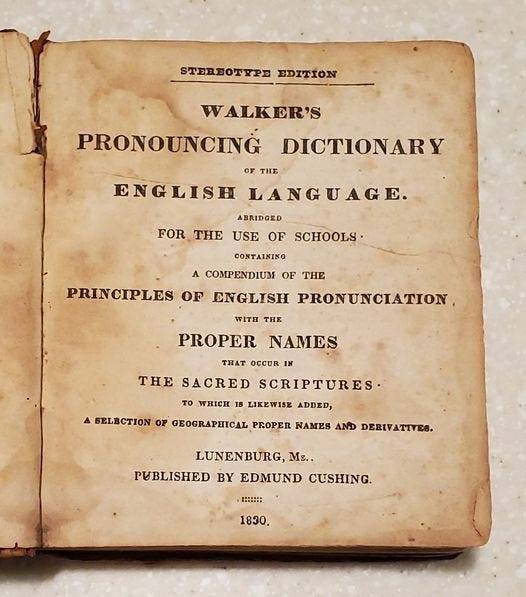
In 1830 a newspaper in North Carolina, the Newbern Sentinel, ran an article about an unpublished dictionary, titled The Cracker Dictionary. The work appears to have remained unpublished (perhaps the title had something to do with this), but in reporting on the words contained in the book’s nascent form the article provides early written evidence of a number of 19th century Americanisms. Among these is absquatulate, which is spelled with an initial O, rather than A, and defined as “to mosey, or to abscond.”
In addition to absquatulate, the reader is informed of the meaning of a number of other similar terms, many of which have retained some degree of currency in our language; flustrated (“frustrated and prostrated, greatly agitated”), rip-roarious, (“ripping and tearing”), and fitified (“subject to fits”) have seen enough continued use that we define them in our Unabridged Dictionary. Other words contained in this never-realized dictionary, such as ramsquaddled (“rowed up salt river”) and spontinaceously (“of one’s own accord”) appear to have been lost with the passage of time.
Two of the loafers, we understand, were yesterday taken and committed to prison; the other has absquatulated. — The Times-Picayune (New Orleans, Louisiana), 13 June 1837

Cracker, sometimes cracka or white cracker, is a racial epithet directed towards white people, used especially with regard to poor rural whites in the Southern United States. Although commonly a pejorative, it is also used in a neutral context, particularly in reference to a native of Florida or Georgia (see Florida cracker and Georgia cracker)
The exact history and etymology of the word is debated.
The term is "probably an agent noun from the word crack. The word crack was later adopted into Gaelic as the word craic meaning a "loud conversation, bragging talk" where this interpretation of the word is still in use in Ireland, Scotland, and Northern England today.
The historical derivative of the word craic and its meaning can be seen as far back as the Elizabethan era (1558–1603) where the term crack could be used to refer to "entertaining conversation" (one may be said to "crack" a joke or to be "cracking wise") The word cracker could be used to describe loud braggarts; An example of this can be seen in William Shakespeare's King John (c. 1595) "What cracker is this same that deafs our ears with this abundance of superfluous breath?"
The word was later documented describing a group of "Celtic immigrants, Scotch-Irish people who came to America running from political circumstances in the old world". This usage is illustrated in a 1766 letter to the Earl of Dartmouth which reads:
I should explain to your Lordship what is meant by Crackers; a name they have got from being great boasters; they are a lawless set of rascalls on the frontiers of Virginia, Maryland, the Carolinas, and Georgia, who often change their places of abode.
The label followed the Scotch-Irish American immigrants, who were often seen by officials as "unruly and ill-mannered" The use of the word is further demonstrated in official documents, where the Governor of Florida said,
'We don't know what to do with these crackers—we tell them to settle this area and they don't; we tell them not to settle this area and they do'
By the early 1800s, those immigrants "started to refer to themselves that way as a badge of honor" as is the case with other events of linguistical reappropriation.
The compound corn-cracker was used of poor white farmers (by 1808), especially from Georgia, but also extended to residents of northern Florida, from the cracked kernels of corn which formed a staple food of this class of people. This possibility is given in the 1911 edition of Encyclopædia Britannica, but the Oxford English Dictionary says a derivation of the 18th-century simplex cracker from the 19th-century compound corn-cracker is doubtful. A "cracker cowboy" with his Florida Cracker Horse and dog by Frederic Remington, 1895
It has been suggested that white slave foremen in the antebellum South were called "crackers" owing to their practice of "cracking the whip" to drive and punish slaves. Whips were also cracked over pack animals, so "cracker" may have referred to whip-cracking more generally. According to An American Glossary (1912):
The whips used by some of these people are called 'crackers', from their having a piece of buckskin at the end. Hence the people who cracked the whips came to be thus named.
Another possibility, which may be a modern folk etymology, supposes that the term derives from "soda cracker", a type of light wheat biscuit which dates in the Southern US to at least the Civil War. The idea has possibly been influenced by "whitebread", a similar term for white people. "Soda cracker" and even "white soda cracker" have become extended versions of "cracker" as an epithet
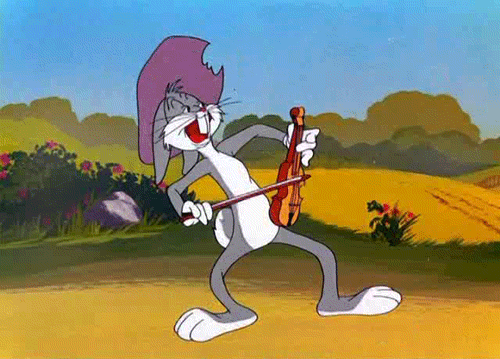
A 1783 pejorative use of crackers specified men who "descended from convicts that were transported from Great Britain to Virginia at different times, and inherit so much profligacy from their ancestors, that they are the most abandoned set of men on earth".
Benjamin Franklin, in his memoirs (1790), referred to "a race of runnagates and crackers, equally wild and savage as the Indians" who inhabit the "desert[ed] woods and mountains".
In his 1964 speech "The Ballot or the Bullet", Malcolm X used the term "cracker" in reference to white people in a pejorative context. In one passage, he remarked, "It's time for you and me to stop sitting in this country, letting some cracker senators, Northern crackers and Southern crackers, sit there in Washington, D.C., and come to a conclusion in their mind that you and I are supposed to have civil rights. There's no white man going to tell me anything about my rights."
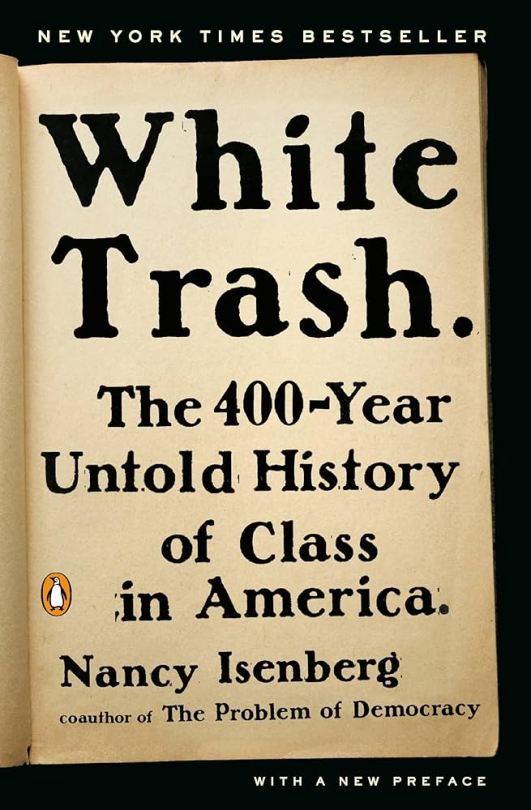
#nancy isenberg#white trash#white trash book#democracy#the problem of democracy#400 years#cracker#kemetic dreams#crackers#banana#pudding#croissant#cereal#chocolate#squatters#squatter#ballot or the bullet#malcolm x#omowale#african#afrakan#brownskin#brown skin#africans#afrakans#nigerian#benjamin franklin#great britain#virigina#soda crackers
9 notes
·
View notes
Text

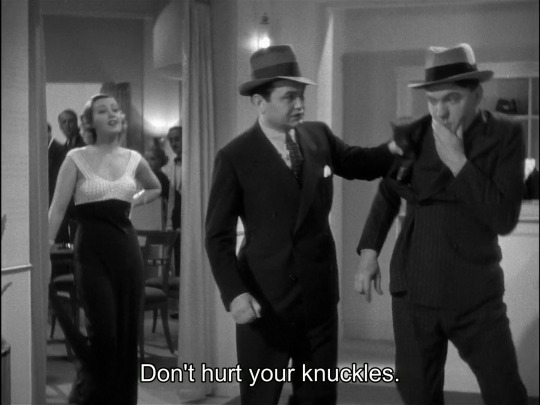
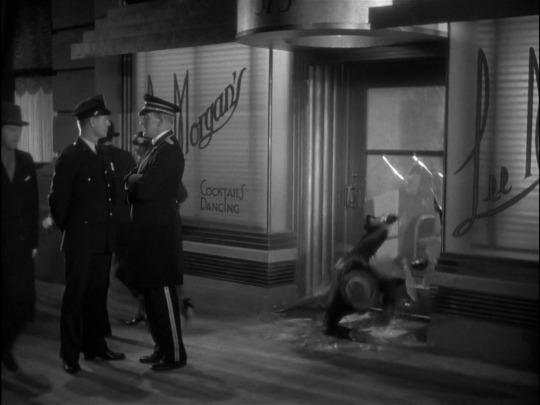
13 notes
·
View notes
Quote
In the wake of a near-tragic assassination attempt of a widely reviled figure, some people who loathe him may be wrestling with or suppressing emotions that feel contradictory. But the notions that Trump is dangerous, and that attempting to murder him is also dangerous, are not in tension with each other. The ethics and the practicality of liberal democracy both affirm a strong norm against political violence. [...] Even though American history has seen a long litany of murders and attempted murders — Gerald Ford survived two attempts on his life within a few weeks of each other — this one feels scarier. That is because our social peace has grown more precarious. An assassination attempt on Donald Trump is a far more dangerous thing than an attempt to kill Mitt Romney would have been a dozen years ago, or Al Gore a dozen years before that. And while the responsibility for maintaining social peace and the norm of non-violence is shared equally across the political spectrum, the blame for its decay is not. Trump stokes and feeds upon a lust for violence. He possesses a demagogue’s skill for manipulating his supporters’ most elemental emotions. As a private citizen he exploited a white woman’s rape in Central Park to demand the execution of innocent young men of color. He continues to call for various critics to be executed for their disloyalty. When a maniac attempted to kill Nancy Pelosi and smashed the skull of her husband, he cheered it on. He continues to glorify and promise to free the criminals who assaulted police in the attack on the Capitol in an attempt to seize an unelected second term. It is not Trump’s fault that someone tried to kill him. It is absolutely his fault that it has immediately set off a widespread fear of reprisals and chaos.
Trump Shooting: He Must Be Defeated by Ballots, Not Bullets
Look, I can’t wait for the guy to die and be gone forever. I just want him to die in prison.
And he’s still a Fascist. Don’t let that get obscured in all of this. He’s still the same wannabe dictator, the same hateful liar, the same corrupt traitor, the same 34 time convicted felon, the same rapist.
Nothing about him has changed. Nothing about Project 2025 has changed.
Obviously, the national conversation is going to be focused on this for the near future, and we can’t forget or minimize that he remains a serious and dire threat to America, and the world.
1K notes
·
View notes